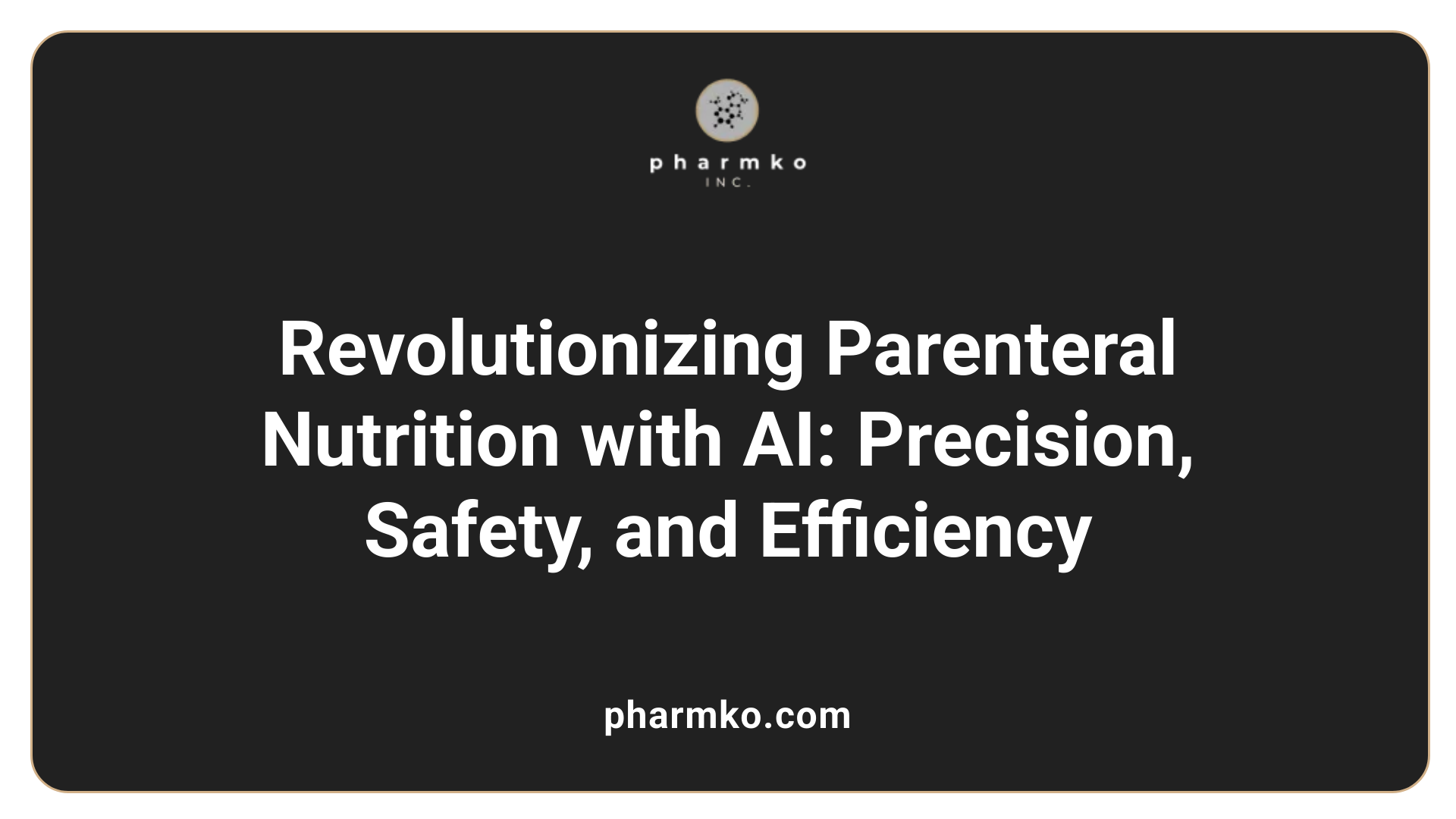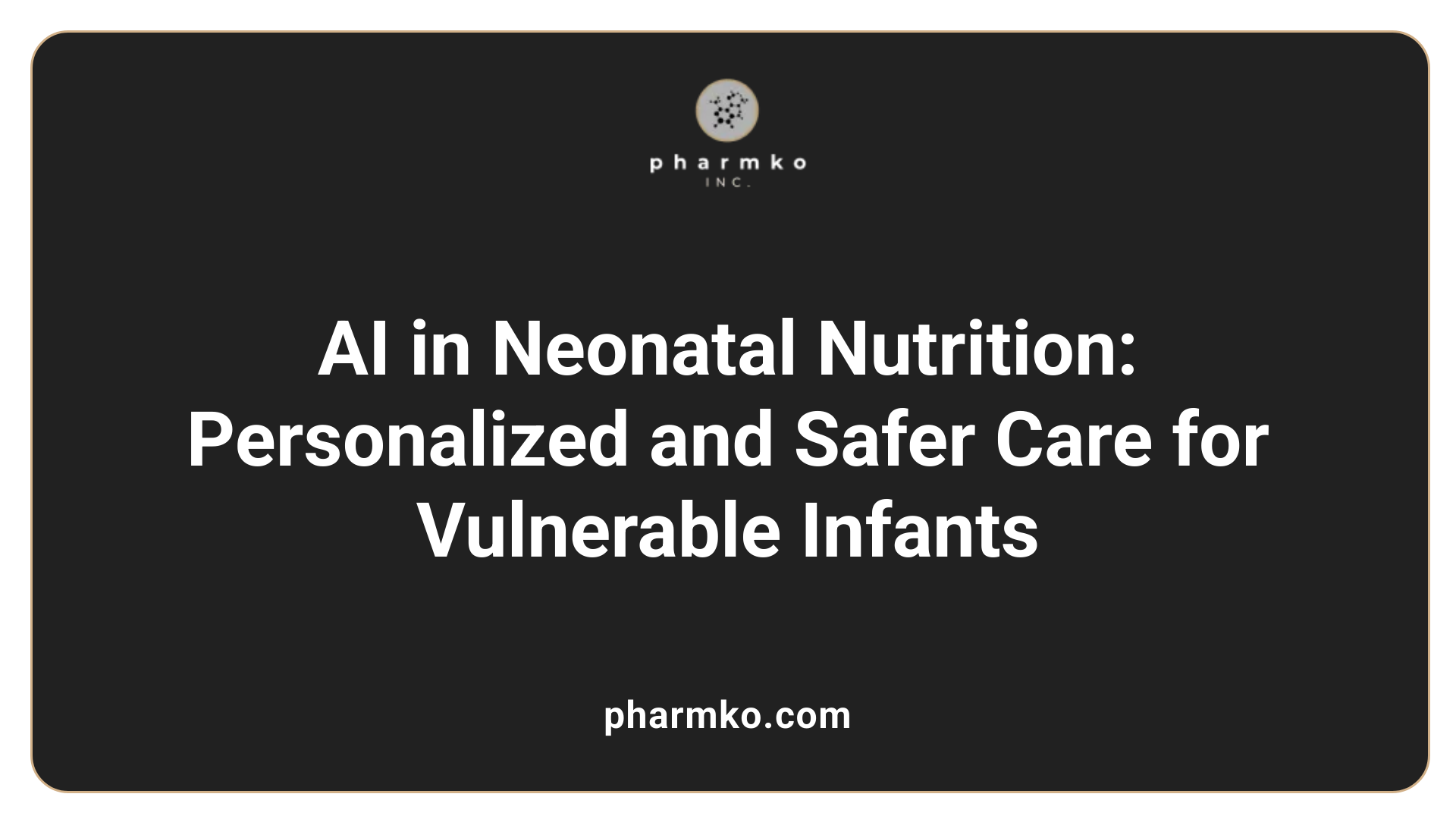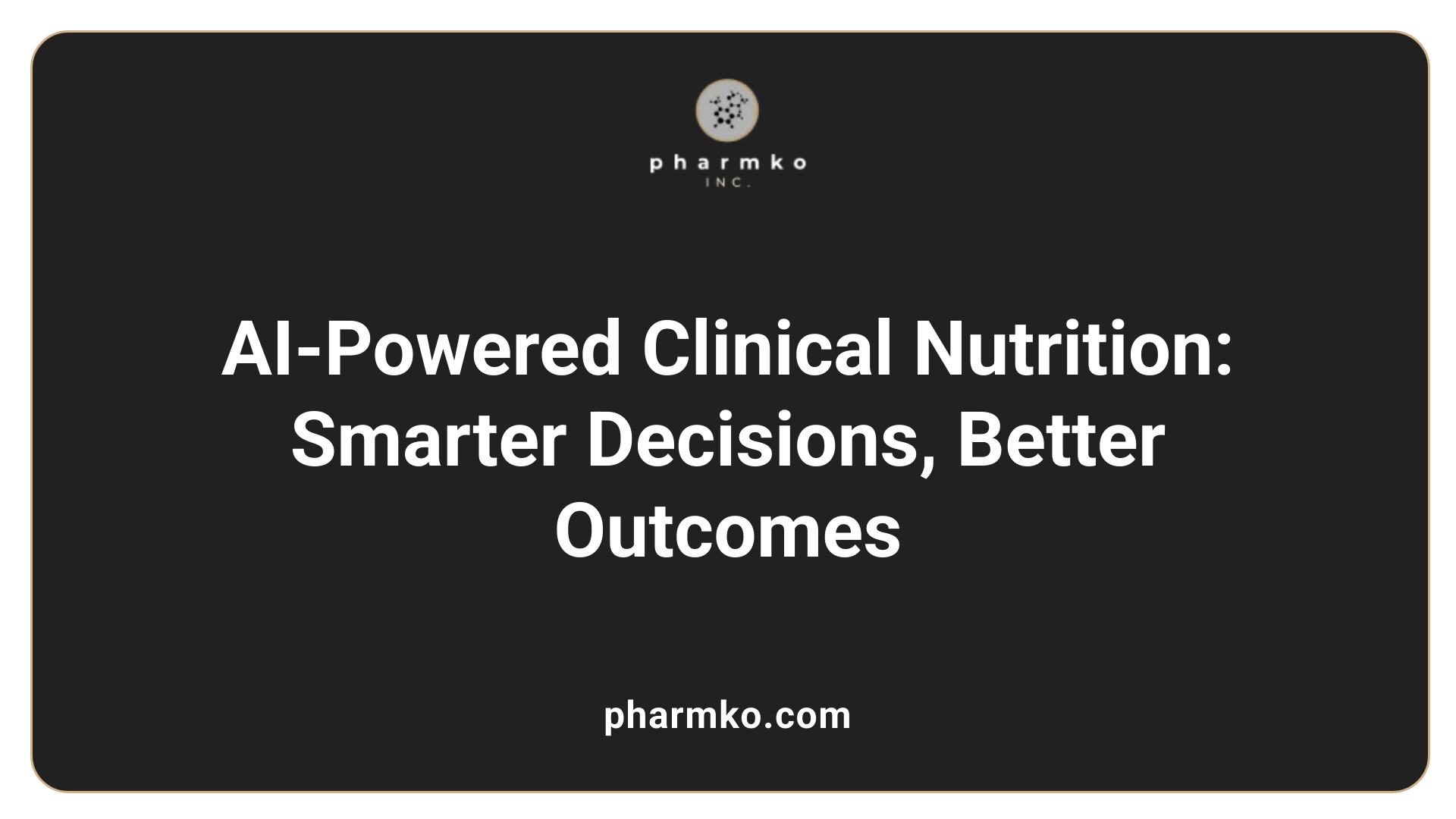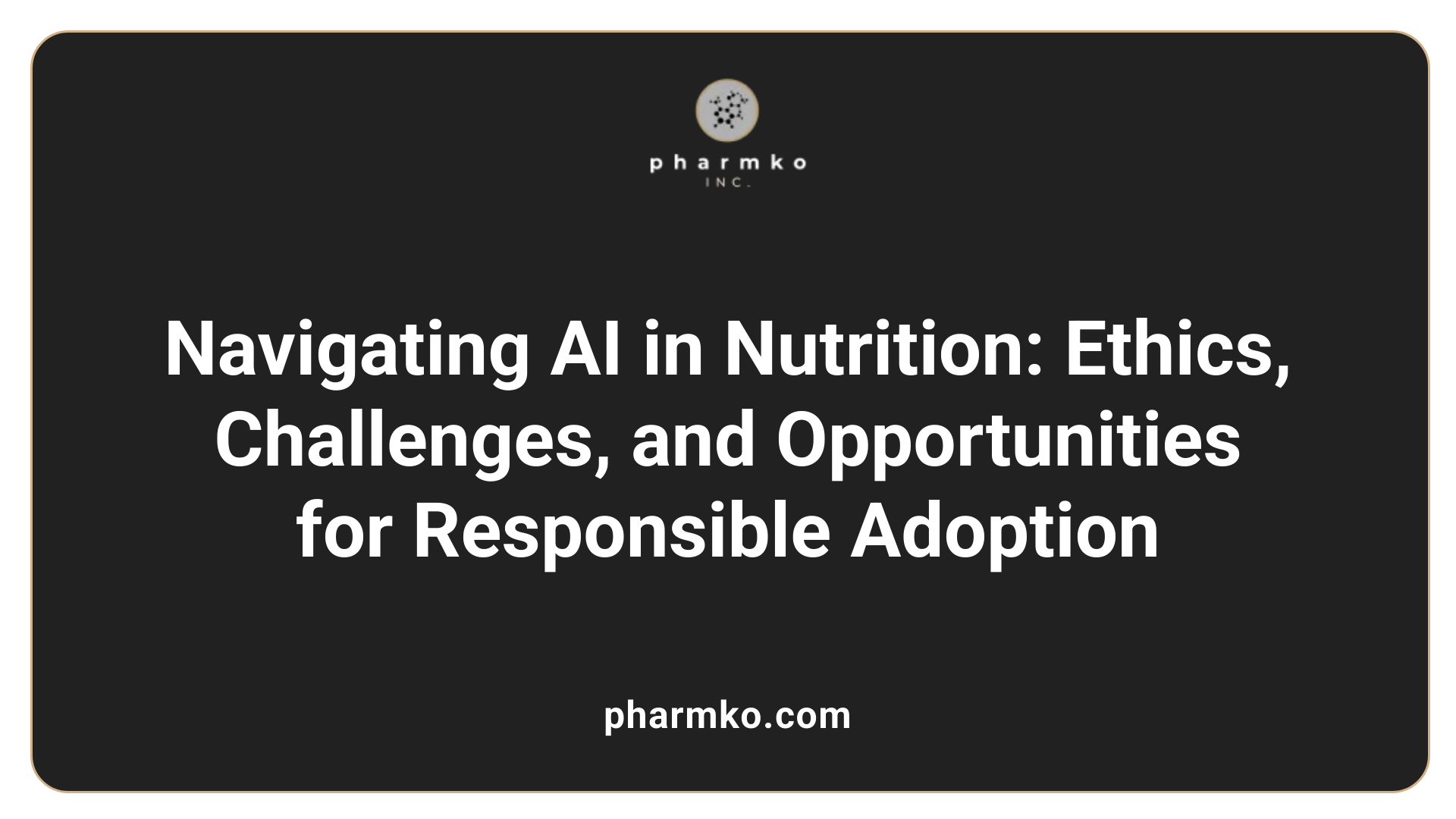The Future of AI and Automation in Parenteral Nutrition Management
Navigating the New Frontier of Nutritional Care
Artificial intelligence and automation are ushering in a new era in the field of clinical nutrition, particularly in the management of parenteral nutrition (PN). From enhancing safety and efficacy to enabling personalized treatments for vulnerable populations such as neonates, these technological advancements promise to optimize therapeutic outcomes while addressing longstanding clinical challenges.
Advances in AI-Driven Parenteral Nutrition Formulation

What are the recent advancements and current trends in AI and automation for parenteral nutrition management?
Recent developments in artificial intelligence (AI) and automation are transforming how we approach parenteral nutrition (PN), especially total parenteral nutrition (TPN). Cutting-edge AI models, such as TPN2.0, utilize vast amounts of clinical data to create more precise and personalized nutrient formulations. Developed from nearly a decade of patient data, these models use sophisticated deep learning architectures, including transformer networks and neural networks, to analyze patient-specific variables like age, weight, and nutritional needs.
The primary goal of these systems is to standardize and optimize TPN prescriptions, reducing human errors and enhancing safety. TPN2.0, for instance, can formulate 15 standardized yet customizable TPN solutions with a high correlation (Pearson’s R=0.94) to expert prescriptions. This high level of accuracy supports clinicians in making faster, safer decisions while maintaining personalized patient care.
Machine learning algorithms now enable real-time monitoring of infusion parameters, such as flow rate and volume, allowing early detection of adverse events like over-infusion or nutrient incompatibilities. These automated checks can potentially decrease medical errors significantly, in some cases by up to 50%. Additionally, AI significantly improves safety, reduces costs, and improves clinical outcomes, especially in vulnerable populations like neonates.
Despite these promising advances, widespread clinical adoption remains limited. Challenges include validating AI models across diverse populations, navigating regulatory approval processes, and investing in infrastructure. Nonetheless, ongoing research indicates that AI-driven approaches are poised to greatly improve the effectiveness, safety, and personalization of parenteral nutrition.
Innovative digital health tools integrated with electronic health records, mobile applications, and wearable devices facilitate continuous data collection. These technologies support remote monitoring and patient engagement, further enhancing clinical decision-making. As AI systems evolve, they promise to make parenteral nutrition management more precise, safer, and tailored to individual patient needs, paving the way for a new era of nutrition care.
Enhancing Safety and Personalization Through AI in Neonatal Care

How does AI and automation impact the safety, efficacy, and personalization of parenteral nutrition?
Artificial intelligence (AI) and automation are revolutionizing parenteral nutrition (PN), especially in neonatal care, by making it safer, more effective, and tailored to individual infants' needs. By analyzing vast and complex datasets, AI helps optimize nutrient formulations, reducing the risk of formulation errors. These errors can cause serious complications such as infections, metabolic disturbances, or necrotizing enterocolitis, which are particularly dangerous for fragile neonates.
Sophisticated AI algorithms, including machine learning and neural networks, can identify the best nutrient combinations for each baby, considering their weight, age, clinical condition, and metabolic responses. This data-driven approach ensures more precise and personalized nutrition plans, decreasing deviations from recommended standards and enhancing clinical outcomes.
AI tools also enable real-time monitoring by integrating data from wearable devices and electronic health records. Such continuous oversight allows healthcare providers to make dynamic adjustments in nutrition therapy, responding swiftly to changes in the infant’s condition or metabolic markers. Early detection of adverse effects and timely modifications can significantly lower the chances of complications like sepsis or feeding intolerance.
The development of AI models, such as TPN2.0, exemplifies these advances. Trained on thousands of neonatal prescriptions, this system generates standardized yet customizable PN formulas that outperform traditional methods in safety and accuracy. Validation studies have shown that AI-recommended formulations correlate highly with expert prescriptions and are associated with reduced neonatal morbidities.
Furthermore, a clinician-in-the-loop approach ensures that AI-generated recommendations are reviewed and adapted by healthcare professionals, maintaining a balance between automation and clinical judgment. This synergy enhances safety, ensures adherence to guidelines, and personalizes care.
Overall, integrating AI and automation in neonatal parenteral nutrition supports a nuanced, evidence-based, and patient-specific approach. Such innovations promise to substantially improve safety, reduce error rates, and optimize health outcomes for the most vulnerable patients.
Transforming Clinical Decision-Making with AI Technologies

How is artificial intelligence influencing research and clinical practice in nutrition and dietetics?
Artificial intelligence (AI) is revolutionizing both research and practice in the field of nutrition and dietetics. By enabling sophisticated analysis of large, complex datasets, AI helps identify patterns and relationships that traditional methods might overlook. This can lead to more accurate nutrition assessments, targeted interventions, and better disease management.
In clinical practice, AI-driven decision support tools assist healthcare professionals in customizing nutritional plans for individual patients. For example, AI algorithms can predict nutritional needs based on patient-specific data such as age, weight, and medical history, guiding clinicians in formulation and monitoring of parenteral nutrition (PN) and enteral nutrition. Technologies like chatbots and image recognition systems automate dietary assessments and malnutrition screening, improving speed and accuracy.
AI also accelerates research by modeling disease outcomes related to diet, optimizing drug-nutrition interactions, and streamlining clinical trials. Despite these advances, ethical considerations—such as data privacy, algorithm bias, and the risk of dehumanizing care—must be carefully addressed. Rigorous validation and regulatory oversight ensure that AI tools are safe and effective. Overall, AI’s influence in this domain promises more personalized, efficient, and effective nutritional care and research outcomes.
How do AI-supported decision tools enhance clinical nutrition?
AI-supported decision tools provide real-time support for clinicians by integrating patient data, medical history, and current health status to recommend optimal nutritional strategies. These tools leverage machine learning to analyze vast datasets swiftly, offering evidence-based suggestions that enhance decision accuracy.
For example, AI can assist in formulating TPN prescriptions, adjusting composition dynamically as patient conditions change, which reduces errors and improves safety. Moreover, AI-powered platforms can monitor patient responses during nutrition therapy, flagging deviations or adverse events promptly.
Such decision support systems also improve efficiency by reducing workload and increasing confidence in clinical choices. They help identify at-risk individuals early, such as malnourished cancer patients or those with gastrointestinal disorders, enabling timely interventions.
How are machine learning and data analytics used in clinical nutrition?
Machine learning (ML) and data analytics are central to advancing personalized nutrition. ML models can analyze electronic health records (EHRs), nutritional intake logs, and microbiota profiles to forecast health risks and optimize dietary plans.
For instance, models trained on thousands of neonatal TPN prescriptions accurately predict optimal formula compositions, aligning closely with expert recommendations (correlation R=0.94). These predictive capabilities assist clinicians in preventing complications like necrotizing enterocolitis in preterm infants.
Data analytics also enable understanding of how diet influences disease progression, supporting evidence-based guidelines. By identifying associations between nutrition patterns and health outcomes, AI-driven analytics inform public health policies and individual patient management.
How is AI integrated with electronic health records and digital platforms?
AI integration with EHRs and digital health platforms streamlines data collection, storage, and analysis. Advanced algorithms extract relevant clinical information, ensuring comprehensive and real-time insights.
Digital platforms equipped with AI can automatically update patient nutritional profiles, suggest adjustments, and generate alerts for clinicians when certain thresholds are crossed. Mobile apps and wearable devices collect ongoing data on dietary intake, physical activity, and physiological parameters, which AI algorithms process for continuous assessment.
This seamless integration facilitates a holistic approach to nutritional care, from hospital AI systems managing PN formulations to outpatient apps helping manage chronic conditions like diabetes.
What are some real-world application examples?
Several practical applications exemplify AI’s role in clinical nutrition:
- TPN Optimization : AI-developed models like TPN2.0 use decades of data to generate standardized, personalized PN formulas, increasing safety and reducing neonatal morbidities.
- Malnutrition Screening : AI tools identify malnutrition risk in various settings, aiding early intervention.
- Disease Predictive Analytics : Algorithms predict complications such as feeding intolerance or refeeding syndrome, allowing preemptive management.
- Patient Engagement : Wearable technologies and apps motivate healthier food choices and monitor nutrition intake.
- Neonatal Care : AI-based prescription systems optimize nutrient formulas for premature infants, reducing errors and improving outcomes.
What is the overall impact on clinician confidence and patient outcomes?
AI enhances clinicians' confidence by providing data-driven, validated recommendations, reducing uncertainties, and decreasing errors, particularly in complex cases like neonatal TPN prescriptions. Studies have shown that AI-guided formulations are rated higher by clinicians compared to traditional methods.
Furthermore, AI’s predictive capabilities, combined with real-time monitoring, lead to fewer adverse events, lower complication rates, and improved patient survival and quality of life. Implementing AI tools generates more consistent nutritional care, promotes precision medicine, and supports clinicians in delivering the most appropriate and timely interventions.
Table: Practical Applications of AI in Clinical Nutrition
| Application Area | Example Technologies | Benefits | Challenges |
|---|---|---|---|
| Parenteral Nutrition (PN) | TPN2.0, transformer models | Standardization, safety, personalization | Validation, regulatory approval |
| Malnutrition Screening | AI-based assessment tools | Early detection, targeted care | Data privacy concerns |
| Disease Risk Prediction | Machine learning analytics | Prevention, optimized interventions | Integration complexity |
| Patient Engagement | Wearables, mobile apps | Improved adherence, real-time feedback | User compliance |
| Neonatal Care | AI prescriptions for premature babies | Reduces errors, improves outcomes | Clinical validation needed |
With continuous advancements, AI is poised to deepen its integration into clinical nutrition, transforming how healthcare professionals tailor interventions for improved patient outcomes.
Automating Nutritional Assessment and Monitoring
What role does AI play in optimizing formulas, reducing costs, and enhancing decision-making in parenteral nutrition?
Artificial intelligence has begun transforming the way clinicians design and administer parenteral nutrition (PN). One prominent example is the development of TPN2.0, an AI-powered system that leverages a decade’s worth of electronic health records, encompassing over 79,000 prescriptions and thousands of patients. Using sophisticated models like transformer architectures, TPN2.0 generates a set of 15 standardized formulas that can be personalized to individual neonatal needs.
This system demonstrates remarkable accuracy, achieving a Pearson’s correlation of 0.94 with expert prescriptions, and outperforms traditional machine learning models. Its high reliability allows clinicians to trust automated recommendations, which can be tailored more rapidly, reducing errors that are common in manual calculations.
AI-driven formulas can enhance safety by minimizing risks such as electrolyte imbalances and nutrient deficiencies, especially in vulnerable populations like premature infants. Studies indicate that adherence to AI-guided prescriptions correlates with decreased neonatal morbidities including necrotizing enterocolitis and sepsis.
Beyond safety, AI optimizes costs by standardizing components, avoiding over- or under-supplementation, and streamlining supply chain management. With real-time data integration, AI systems can monitor ongoing administrations, adjust nutrient delivery promptly, and flag potential complications early.
This integrated approach supports clinicians in making informed, evidence-based decisions. It facilitates collaboration, balancing automation with expert oversight via clinician-in-the-loop models, thus ensuring guideline compliance and personalized care.
The ongoing evolution of AI technologies—such as advanced transformer models—aims to further refine these capabilities, promising a future where parenteral nutrition is safer, more cost-effective, and precisely tailored to each patient's needs.
In summary, AI enhances parenteral nutrition management by standardizing and personalizing formulas, reducing operational costs, and supporting clinical decision-making, ultimately leading to better patient outcomes.
Future Perspectives and Research Directions in AI for Clinical Nutrition
What are the future research directions and scientific insights in the application of AI to clinical nutrition?
The field of AI in clinical nutrition is rapidly evolving, with research increasingly focused on enhancing patient outcomes through innovative technology. Future studies should prioritize rigorous clinical trials to validate AI tools, ensuring they are safe, effective, and applicable in real-world settings. These validations are crucial for building trust among healthcare professionals and regulators.
Developing more comprehensive models that incorporate diverse patient data—including socio-cultural, demographic, and genetic factors—will improve personalization and promote health equity. Tailoring recommendations based on individual backgrounds ensures better adherence and outcomes.
Addressing malnutrition in low-resource environments is another promising avenue. AI can help identify at-risk populations and optimize resource allocation, making nutritional interventions more accessible and impactful.
Advances in natural language processing and semantic search through large language models (LLMs) hold significant potential for clinical decision support. These technologies can rapidly synthesize vast amounts of literature and patient data, providing clinicians with contextual, evidence-based recommendations.
However, integrating these innovations must be coupled with a strong emphasis on ethical and regulatory considerations. Issues such as algorithmic bias, data privacy, and security need ongoing attention to prevent harm and ensure equitable access.
Expanding research to include underrepresented groups in clinical trials and real-time patient monitoring technologies will further refine AI tools, making them more accurate and inclusive.
In summary, the future of AI in clinical nutrition hinges on rigorous validation, inclusivity, technological advancements, and ethical implementation. Such efforts will enable personalized, safe, and effective nutrition strategies that adapt to evolving healthcare needs.
| Research Focus Area | Goals | Potential Impact |
|---|---|---|
| Clinical validation studies | Confirm safety and effectiveness of AI tools | Increased clinician confidence, regulatory approval |
| Socio-cultural and demographic data | Enhance personalization and equity | Better adherence and health outcomes |
| AI in low-resource settings | Expand accessibility of nutritional care | Reduce disparities, improve global nutritional health |
| Advanced language models and semantic search | Support quick, evidence-based clinical decisions | Accelerate diagnosis and personalized treatment plans |
| Ethical and regulatory frameworks | Ensure safety, fairness, and data protection | Responsible AI deployment in healthcare |
Staying at the forefront of these research directions will facilitate a future where AI effectively supports personalized nutrition management, ensuring safer and more equitable health outcomes worldwide.
Challenges to Widespread Adoption and Ethical Considerations

What benefits, challenges, and opportunities does AI offer in the field of clinical nutrition?
Artificial Intelligence (AI) is transforming clinical nutrition by enhancing patient care, optimizing dietary interventions, and facilitating personalized medicine. AI tools can improve the accuracy of dietary assessments through food recognition algorithms and predictive models that anticipate health outcomes related to nutrition. Wearable devices and chatbots foster better patient engagement and adherence to nutritional plans.
One notable benefit of AI is its ability to analyze large and complex datasets, such as microbiota profiles and metabolomics, to identify new insights into diet-disease relationships. This can lead to more precise and effective interventions, ultimately improving clinical outcomes and reducing healthcare costs.
However, alongside these benefits come significant challenges and opportunities. Validation and regulatory approval processes are still ongoing, limiting the immediate clinical integration of many AI applications. Infrastructure investments are necessary for healthcare facilities to adopt AI tools effectively, including data management and cybersecurity measures.
Bias and fairness in AI models pose critical concerns. If training data lack diversity or contain biases, the AI's recommendations may be unfair or ineffective for certain populations. Transparency and explainability are also vital issues; clinicians and patients need to understand AI decision-making processes to trust and adopt these systems.
Legal and ethical implications include concerns about data privacy, informed consent, and accountability for AI-driven decisions. Striking a balance between innovation and responsibility requires establishing guidelines and standards for safe AI use.
To address these challenges, strategies for responsible implementation involve rigorous validation, continuous monitoring, and updates of AI tools. Engaging multidisciplinary teams—including clinicians, data scientists, and ethicists—can help develop models that are transparent, equitable, and aligned with patient needs.
While current applications are in early stages, the future of AI in clinical nutrition holds enormous potential for advancing precision medicine. Researchers envision integrating AI with Big Data and Large Language Models (LLMs) to customize nutritional therapies further, making them safer, more accessible, and more effective.
| Aspect | Challenges | Opportunities | Additional Notes |
|---|---|---|---|
| Validation & Approval | Limited validation studies; regulatory hurdles | Ensures safety and efficacy | Clinical trials and standards needed |
| Bias & Fairness | Data bias; demographic gaps | Promote equity in healthcare | Datasets should be diverse |
| Transparency | Opaque algorithms; explainability gaps | Increase trust & adoption | Use of explainable AI models |
| Legal & Ethical | Data privacy; accountability | Develop responsible AI use policies | Clear guidelines required |
| Infrastructure | High costs; tech integration | Enhanced care delivery; widespread access | Investment in digital health infrastructure |
As AI continues to evolve, collaboration across healthcare, technology, and regulatory sectors will be essential. Responsible and ethical deployment can ensure AI’s benefits are realized equitably, improving clinical nutrition worldwide.
Charting the Path Forward in Nutritional Innovation
The integration of artificial intelligence and automation into parenteral nutrition management is poised to redefine the landscape of clinical care. As models like TPN2.0 demonstrate high accuracy, safety, and clinician acceptance, the future beckons with prospects of more personalized, efficient, and safer nutritional support. Challenges remain in validation, regulation, and ethical deployment, but ongoing research and technological innovation promise to address these hurdles. Ultimately, the convergence of digital health tools, AI, and clinical expertise will forge a new era—one where patient-centered nutrition is smarter, safer, and more effective than ever before.
References
- The Modern Approach to Total Parenteral Nutrition - PubMed
- The future of artificial intelligence in clinical nutrition - PubMed
- AI-guided precision parenteral nutrition for neonatal intensive care ...
- Artificial intelligence & clinical nutrition: What the future might have ...
- AI/ML in Total Parenteral Nutrition | IEEE Computer Society
- AI can help doctors give intravenous nutrition to preemies, Stanford ...
- Role of artificial intelligence in critical care nutrition support and ...
- The Application of AI in Clinical Nutrition - Biores Scientia













